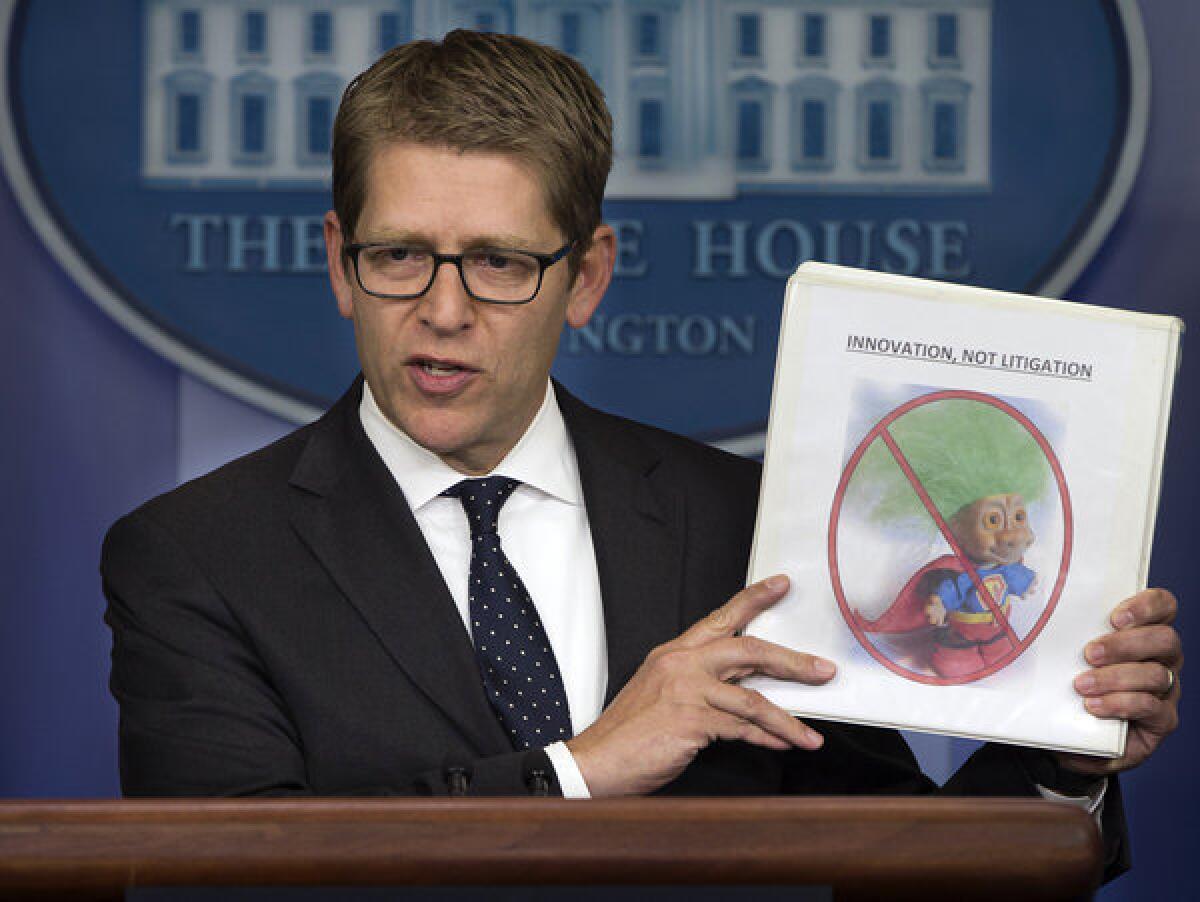Congress vs. the ‘patent trolls’

- Share via
Less than two years after Congress enacted a long-awaited overhaul of patent law, President Obama is pushing lawmakers to address more problems in the patent system. This time the target is “patent trolls,” companies that exist solely to buy obscure patents and then collect money from manufacturers, retailers and even consumers for allegedly infringing them. The challenge is how to stop the trolls without leaving small inventors at the mercy of big manufacturers.
The U.S. patent system is almost as old as the republic, dating back to 1790. But the Patent and Trademark Office was ill-equipped for the digital revolution of the late 20th century, when patent applications skyrocketed — including those for software programs and “business methods,” which some critics say should not be eligible for protection. Complaints multiplied too, as tech manufacturers in particular argued that patents were being used to stifle innovation, not to promote it.
Most of the complaints about the system stem from one central problem: The overworked patent office awards too many patents for “inventions” that aren’t really novel, or whose claims cover far more ground than the invention itself does. To that end, Congress enacted the America Invents Act in 2011 to give patent examiners more resources and make it easier to challenge bad patents administratively. Meanwhile, several court rulings have raised the standard for winning a patent and made it harder to use patents to keep competing products off the market.
The new law offered little help, though, to those squaring off against patent trolls already armed with overly broad or dubious patents. Of particular concern are the litigious patent holders who are suing not the manufacturers of products that allegedly infringe their patents but the purchasers and users of those products. For example, a company holding patents related to Wi-Fi routers has sued scores of coffee shops, retailers and hotels that have Wi-Fi hot spots, and several companies claiming to hold patents related to distributed computing have been threatening to sue small businesses that had purchased Internet-connected scanners.
That’s abusive, and Congress should make sure that businesses and consumers don’t get sucked into fights between patent holders and manufacturers that incorporate disputed technologies into their products. If using a product as designed infringes a patent, the liability should rest with the manufacturer that put it on the market, not the consumer who bought it off the shelf.
Obama’s latest patent reform initiative also calls for lawmakers to protect technology buyers, among other steps. And to discourage nuisance patent challenges, it urges Congress to give judges more power to require patent holders who lose an infringement lawsuit to pay their target’s legal fees. But “loser pays” provisions should be applied equally to both sides and only when there’s clear evidence of bad faith. Otherwise, small inventors could have trouble enforcing legitimate claims in court.
Policymakers shouldn’t assume that every non-manufacturing company that buys patents is a troll. Patent aggregators can play a vital role in protecting the interests of legitimate small inventors. That’s because they have more wherewithal to assert claims over patents that manufacturers really do violate.
Nor are patent aggregators the only ones using patents as a weapon to stop new products and services. Just look at how giant tech companies have been fighting to persuade the courts and the International Trade Commission to impose huge fines and injunctions on one another. Several of those battles revolve around technologies that patent holders have agreed to classify as “industry standards,” making them available for all to use in exchange for a reasonable licensing fee. When disputes over these technologies arise, patent holders should be entitled to royalties but not injunctions that keep offending products off the market.
Again, the best defense against patent trolls is to stop the patent office from granting bad patents. That’s a work in progress. In the meantime, Congress should do more to protect consumers from getting caught in the middle of disputes between manufacturers and patent holders, and to deter competitors from using the courts and the International Trade Commission to prevail in fights that belong in the marketplace.
More to Read
A cure for the common opinion
Get thought-provoking perspectives with our weekly newsletter.
You may occasionally receive promotional content from the Los Angeles Times.






